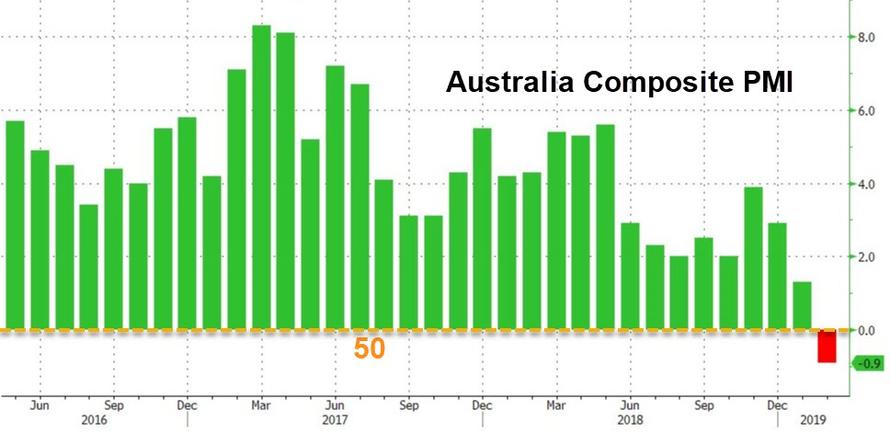February showed a deterioration in Australian service sector activity for the first time since the survey began nearly three years ago.
Given the collapse in China’s PMI, it is not entirely surprising that the seasonally adjusted Commonwealth Bank Composite Output Index slipped from 51.3 in January to 49.1 in February, signalled a decline from expansion. The latest reading reflected a deterioration in service sector conditions and slower growth in the manufacturing sector. As Markit notes, a decrease in new business inflows was recorded for the first time since the survey started in May 2016, while overseas demand growth eased noticeably. Weaker demand exerted less pressure on operating capacity. Firms reported only a marginal increase in the level of outstanding business, the slowest rise for six months.
Meanwhile, in a recent interview with the Australian Financial Review, tech entrepreneur Matt Barrie shared his views on the challenges facing Australia and the wider world – and his predictions are grim.
“The global economy is troubled. It’s low growth everywhere. It’s questionable if we ever exited the GFC,” Mr Barrie told the publication.
“In Australia every indicator is blinking red. It’s a house of cards. We’re highly dependent on China (we’re on par with the Congo for how reliant we are) and they are in a trade war. We have the housing market falling off a cliff, and this is happening from Vancouver to Auckland too.
“The royal commission will be a catalyst for the collapse of the Australian housing market, with the other catalyst being China coming off the boil and regulations to stop the flow of capital out of China. We should never have let the property bubble get this big. People can’t afford the homes and wages haven’t kept up.”
Mr Barrie said he was concerned the next Australian government would launch “populist policies” which could send us on our way to becoming “the next Argentina”.
Unfortunately, Mr Barrie’s grim view is not an isolated one.
Former Coalition adviser John Adams told news.com.au we were starting to see more signs that Australia was heading towards an “economic Armageddon” – a scenario Mr Adams has warned about since 2016.
“Across the world, evidence is mounting that the world is drenched in debt and that more and more people, companies and governments are struggling to service these debts given slowing economic growth,” he said.
“The IMF rang the alarm bells last week when it stated that Australia faced significant macrofinancial risks resulting from high property prices and household debt levels. These risks make Australia extremely vulnerable to a catastrophic economic crisis.
“The economy will no doubt continue to worsen in 2019 and 2020. Many Australians will see their so-called wealth evaporate and many will suffer significant financial losses. The day of reckoning resulting from the biggest debt bubble in Australian history is fast approaching.”
Finally, we note that the RBA decision is due tonight.
While The Reserve Bank of Australia is expected to keep its benchmark interest rate at 1.5%. Nomura has revised its call for Australian monetary policy, saying it now expects the central bank to deliver 50bps of interest-rate cuts this year, according to a note. The company abandoned its call for Reserve Bank of Australia to stay on hold in 2019 and 2020 after further signs of weaker growth and increasing downside risks, strategist Andrew Ticehurst wrote in note. RBA will probably lower cash rate by 25bps each in July and August; it’s unlikely to hold off on easing for too long as it can take a while for the impact of a cut to filter through.
via ZeroHedge News https://ift.tt/2EMhBXM Tyler Durden
